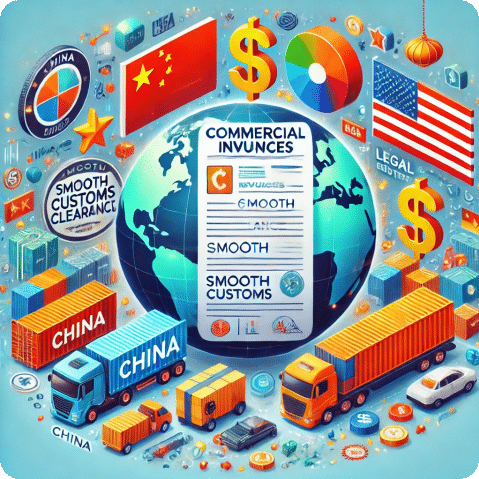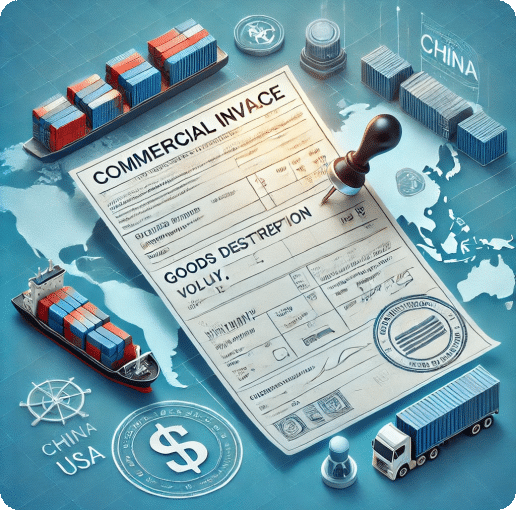When importing goods from China to the USA, the commercial invoice plays a crucial role in ensuring smooth customs clearance and legal compliance. It serves as a key document in international trade, providing details about the transaction, the goods being shipped, and the financial agreement between the buyer and seller. In this guide, we’ll break down the importance of the commercial invoice, its required elements, and how to ensure it is correctly prepared to avoid delays and additional costs.

What is a Commercial Invoice?
A commercial invoice is a legal document provided by the exporter (seller) to the importer (buyer) and is required for all international shipments. It acts as a bill of sale and includes essential details about the shipment, such as a description of the goods, the value of the shipment, and payment terms. This document is crucial for customs clearance, as it helps customs authorities assess duties and taxes on imported goods.
In the case of shipping from China to the USA, the U.S. Customs and Border Protection (CBP) relies on this document to verify that the shipment meets all regulatory and tax obligations.

Key Elements of a Commercial Invoice
To avoid any complications when importing from China to the USA, it is vital that the commercial invoice includes all required information. Below are the critical components that should be present in the invoice:
Exporter and Importer Details
- Exporter Information: Includes the full name, address, and contact details of the Chinese exporter or manufacturer.
- Importer Information: Provides the details of the buyer in the USA, including name, address, and contact information.
Invoice Number and Date
- Each invoice should have a unique invoice number for tracking and reference, as well as the date the invoice was issued.
Detailed Description of Goods
The product description should be clear and specific. The description should include:
- Type of goods (e.g., electronics, textiles, machinery, etc.)
- Quantity and unit of measure
- Material composition, if necessary
- Any other identifying information that helps customs understand what is being imported
Harmonized System (HS) Code
- The HS code is a standardized international code used to classify traded products. The HS code determines the applicable duties and tariffs, so it’s important to use the correct code.
Value of Goods
The commercial invoice must list the total value of the goods being imported. This includes:
- Unit price for each item
- Total cost for the quantity being imported
- Currency in which the goods are being priced (usually USD for shipments to the USA)
Terms of Sale (Incoterms)
- The Incoterms define the responsibilities of both the buyer and seller regarding shipping, insurance, and customs clearance. Common Incoterms used in China-USA trade include FOB (Free on Board), CIF (Cost, Insurance, and Freight), and DAP (Delivered at Place).
Payment Terms
- Clearly outline the payment terms, including when and how the payment is to be made (e.g., via wire transfer, letter of credit, etc.).
Country of Origin
- The country of origin for the goods must be clearly indicated as “China.”
Signatures
- A signature from the exporter confirms that the information provided is accurate and valid.
Why is the Commercial Invoice Important?
The commercial invoice is vital for several reasons:
- Customs Clearance: U.S. customs authorities rely on the information in the commercial invoice to calculate import duties, tariffs, and taxes. Missing or incorrect information can result in delays, fines, or additional inspections.
- Verification of Shipment: The invoice serves as proof of the transaction between the buyer and seller, documenting the agreed-upon goods, their value, and payment terms.
- Tax and Duty Calculation: The commercial invoice provides customs with the necessary information to determine the applicable import duties, customs fees, and taxes based on the HS code and value of the goods.
Common Mistakes to Avoid in a Commercial Invoice
Inaccurate Product Descriptions
- Providing vague or incomplete product descriptions can lead to customs delays or rejection. Always be specific and use correct terminology.
Incorrect HS Codes
- Using the wrong HS code can result in either overpaying or underpaying duties. This can lead to fines or complications with customs authorities.
Misstating the Value of Goods
- Under-declaring the value to save on taxes and duties can result in severe penalties and delays. Always declare the accurate value of goods.
Missing Incoterms
- Failing to specify Incoterms can lead to confusion over who is responsible for costs like shipping and insurance. Ensure the terms of sale are clearly outlined.
Ensuring Compliance with U.S. Customs
To ensure smooth processing of your shipment from China to the USA, it is crucial to:
- Double-check the details on the commercial invoice before shipping. Make sure all required elements are included.
- Consult with a freight forwarder or customs broker to ensure the commercial invoice complies with both Chinese export laws and U.S. import regulations.
- Use correct Incoterms to define the shipping responsibilities clearly, avoiding misunderstandings or unexpected costs during transit.

Tonlexing’s Expertise in Managing Commercial Invoices
At Tonlexing, we specialize in helping businesses with their international shipping needs, including the preparation of accurate and compliant commercial invoices for shipments from China to the USA. Our team ensures that all documents are correctly prepared, minimizing the risk of delays and avoiding additional customs fees. Whether you’re shipping small goods or large cargo, we provide seamless logistics solutions tailored to your specific needs.


